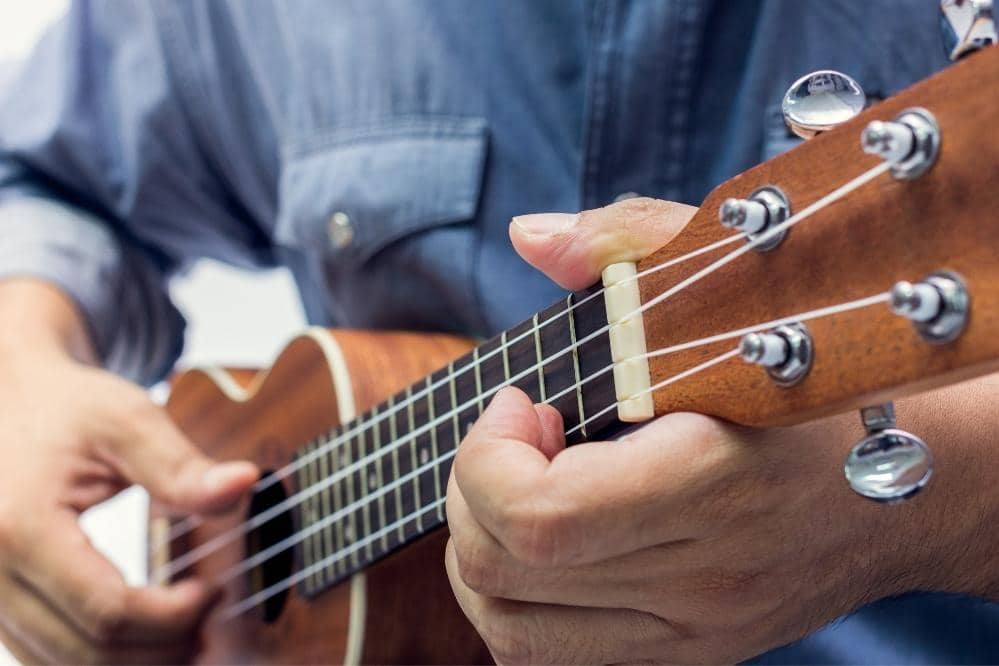When you start playing the ukulele, you might feel as though you are annoying anyone within range. You need to stick it out while you are learning. Everyone goes through this process in the beginning, and the key is to understand how to make it sound better when you play. If you are wondering, “Why does my ukulele sound weird,” take a look at the following five reasons so that you can improve.
Five Reasons Why Your Ukulele Sounds Bad
It is important to understand that your ukulele might not have anything wrong with it; you simply need to learn how to fix the problem when it sounds bad. There are several different reasons why you might not be happy with your ukulele sound.
1. You Are Holding It Incorrectly
One reason why your ukulele might sound bad is that you are holding it incorrectly. New players often lean over to look at the fretting board to make sure that they are using the correct strings. The problem is that when you lean over, it changes the position of the ukulele and you won’t be able to strum effectively. Your sleeves could get in the way, and your hand won’t be in a comfortable position. If you want to see the fretboard, you can try playing in front of a mirror so that you can hold your form.
Your finger positioning could also be incorrect. If you have your finger too close to the fret boards, they might create a buzzing. You want to keep your finger in between the bars, and you should practice so that you get used to having your fingers in the right place.
2. You May Have an Issue with Your Strings
Another issue that can make your ukulele sound bad is your strings. If they are new, they may need time to stretch. During this period, it is normal for your ukulele to sound bad until you get them tweaked. Another issue could be that you need new strings. When it is time to change them, they will start to sound lifeless and dull. You won’t get the same bright sound out of them.
You should also check your strings to make sure that they are put on in the right order. They need to go in order: G, C, E, A; if they are out of order, they won’t sound good. If you aren’t sure how to check, go to a professional or someone with experience, and they will be able to help you.
3. You Need a Better-Quality Ukulele
All ukuleles are not made equally. If you received a ukulele as a gift, the person might not have known what to look for in a quality ukulele. People often start out with a lesser quality instrument to see how it goes before making a commitment and investing in a better ukulele.
There are features, such as the quality of the wood, the build, and the strings, that will have an impact on how the ukulele sounds. If you are serious about playing the ukulele, you need to invest in a decent-quality instrument.
4. Environmental Factors Can Impact Your Ukulele
Your ukulele is made of wood, and it is susceptible to the environment. Wood is hygroscopic, so it absorbs moisture. Then, it expands. Once the environment becomes dry again, the wood will shrink, and if it gets too dry, it can crack or break. If you keep your ukulele in a closet and there is humidity, it can get damaged. It may swell and warp, and it won’t sound the same.
The ideal humidity level is between 45% and 50%, and you can get a tool to monitor it. If your home is too humid, you can get a dehumidifier to protect your ukulele. You can buy one that is portable and keep it near your ukulele. You should also store your instrument in a case for added protection. If your ukulele suffers any changes from the environment, it won’t sound the same any longer.
5. You Need to Tune Your Ukulele
When you start playing the ukulele, it is important to get into the habit of tuning it each time you take it out. You may simply need to check to see that it is in tune, or you may need to make some adjustments. This is important because your ukulele won’t sound right if it isn’t in tune. Keeping it tuned will help you learn to recognize the notes and the chords.
You can use a tuning device at the beginning of each session. Then, speed time practicing the five main chords. As you improve and develop your ear, your ukulele will sound better when you play it. You will develop the skill to recognize when it is out of tune, which makes it easier to know why it sounds bad.
Final Words
When you are learning to play the ukulele, sometimes it might sound bad. This can be frustrating because you may not know what the problem is. There are a number of different reasons that your ukulele can sound bad. You should go over the basics. Make sure that you are holding it correctly and tune it before you play it each time. You should store it properly in a case with the right humidity levels. If you plan to continue playing, you need to make sure that you have a good-quality ukulele.




